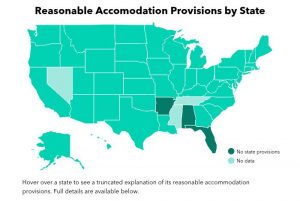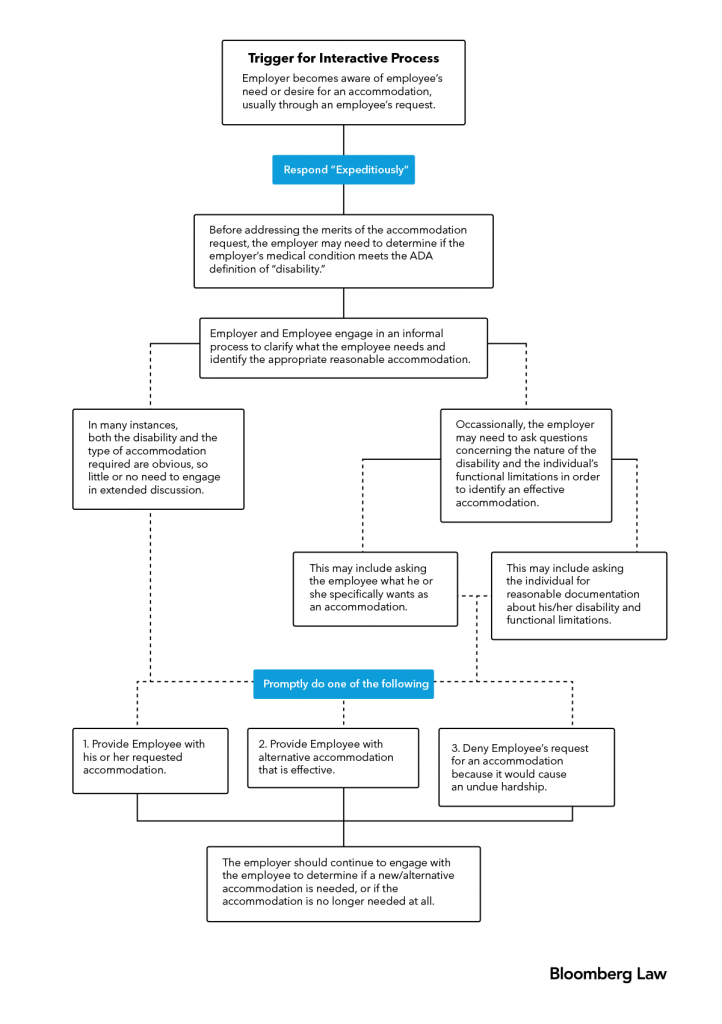TOPIC
Americans with Disabilities Act
January 7, 2022
The Americans with Disabilities Act prohibits employers with 15 or more employees from discriminating against employees and applicants with disabilities who are qualified for job positions. More specifically, employers are prohibited from discriminating against applicants with disabilities in hiring decisions and against employees with disabilities in decisions related to termination, wages, training, fringe benefits, or any other term, condition, or aspect of employment.
Employers also cannot limit, segregate, or classify employees or applicants with disabilities in any way that adversely affects their job opportunities or status as employees or applicants. In addition, employers must make reasonable accommodations for the known physical and mental limitations of employees or applicants with disabilities who are otherwise qualified for positions unless the accommodations create undue hardship.
Bloomberg Law has the legal content and tools you need to stay on top of the dynamic field of labor and employment law.
What are reasonable accommodations under the ADA?
Under the Americans with Disabilities Act, employers must make reasonable accommodations for the known physical and mental limitations of employees and applicants with disabilities who are qualified for job positions unless the accommodations create undue hardship. Employers do not have to provide reasonable accommodations to employees and applicants who are regarded as disabled.
Reasonable accommodations are employer modifications to:
- job application processes for qualified applicants with disabilities to enable them to be considered for jobs;
- work environments for employees with disabilities who are qualified that allow them to perform the essential functions of the job they seek or hold; or
- benefits and privileges of employment for employees with disabilities who are qualified to enable them to enjoy such benefits and privileges as other similarly situated employees without disabilities.

Fast Answers: Covid-19 and the ADA
In this special report, employers get answers to questions about ADA and accommodation issues relating to Covid-19 vaccination policies.
Is working from home or teleworking considered a reasonable accommodation under the ADA?
Yes. Working from home or teleworking may be a reasonable accommodation under the ADA unless an employer shows that another accommodation is effective or telework creates undue hardship.

Explore: Covid and the ADA
Understand Covid’s impact on the risk of litigation and evolving employment policies and procedures.
What is the “undue hardship” exception for reasonable accommodations under the ADA?
Under the Americans with Disabilities Act, employers must make reasonable accommodations for the known physical and mental limitations of employees and applicants with disabilities who are otherwise qualified for positions unless the accommodations create undue hardship.
Undue hardships are actions requiring significant difficulty or expense in the light of a number of factors. These factors include the nature and cost of the accommodation in relation to the size, resources, nature, and structure of the business.
A non-exhaustive list of factors that an employer should consider in assessing whether an accommodation would constitute undue hardship includes its nature and cost as well as the employer’s available financial resources and the accommodation’s impact on the employer’s facility.

Subscribers-Only: Sample Form – Assess Undue Hardship of Accommodation
Rely on Bloomberg Law’s expert Practical Guidance to help you assess the undue hardship of accommodation.
How do state disability discrimination laws vary from the Federal ADA?
Employers must comply with all the laws that apply to them. Most states generally prohibit disability discrimination and require employers to provide reasonable accommodations. However, some states define disability more broadly than federal law or include or exclude specific accommodations. When that happens, employers need to be sure that their decisions comply with both laws.
State law is only preempted when there is a direct conflict (which is rare in this space).

Explore: Discrimination Laws by State Map
Highlight a state to learn about its reasonable accommodations provisions.
Related Labor & Employment Resources
Customer Testimonial: Tina Harkness
Learn how one dedicated labor & employment attorney unlocks the value of Bloomberg Law in her everyday practice.
Bloomberg Law 2024
Discover the top issues shaping the legal landscape in 2024 with data-rich, actionable perspectives to help you prepare.
Stay ahead of developments with Bloomberg Law’s market-leading news sources, including the Daily Labor Report
See for yourself
Not a subscriber? Get the legal research tools and analysis you need to practice smarter, faster, better – request pricing now.
